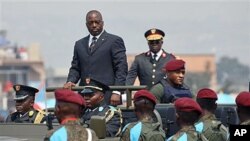The Democratic Republic of Congo's second election since independence on November 28th could spill into violence, opposition candidates and civil society leaders say, if the massive country's government doesn't do more to ensure a just and peaceful vote.
Africa's third largest country, a vast and roadless rainforest the size of Western Europe, heads for just its second election in fifty years this November. Yet with only three months left before its 70 million people cast ballots, many say the Democratic Republic of Congo is hardly prepared.
Ongoing war
There is war across this country, mainly in the east, where a hodgepodge of militias have fought for decades.
But even in the nominally peaceful west of the country, in the capital Kinshasa, civil society leaders fear the nation lacks the security apparatus to maintain public order.
The International Crisis Group Central Africa Program Director Thierry Vircoulon is among those worried. He says he wonders if the Congolese police even have the wherewithal to control the enormous crowds certain to rally through streets and stadiums in this city, which is the opposition's stronghold. Just last month, police shot a civilian during a clash with demonstrators in this city of 10 million people.
Under-trained police
Such police / citizen violence may become Kinshasa's new normal, he says, as elections grow closer.
"The Congolese police is not very well equipped, actually to do crowd management," he said. "They're receiving training by the United Nations and by the European Police Mission in Kinshasa, training in terms of especially crowd management. But we are concerned that actually this training is too little and maybe too late given the size of the problem."
Many politicians also say they're unnerved by the potential for election violence throughout this massive state in the heart of Africa.
Ivoirianization
Vital Kamerhe of the Union Fait La Nation du Congo Party says Congolese candidates often don't even have good bodyguards. He is worried, he said, about Congo repeating the tragic mistakes of West Africa's Ivory Coast, which fell into a civil war after last November's elections. What Kamerhe doesn't want, he says, is the Ivoirianization of Congo's democracy.
"We have a concern," he says. "How are we, the political actors, going to be protected? How is this process going to be secured?," he asks.
"We don't want this country to fall into chaos," he adds. "We are all for a peaceful climate to prevail, and I'm the first to say that."
Frustrations are mounting, however, on growing concerns that the country's elections will be less than fair, according to Vircoulon.
Congo's second election, he says, was supposed to announce the consolidation of the country's fledgling democracy. But the two-round election has been reduced to a one-round, winner-take-all vote that is quite likely to end in an easy win for incumbent President Joseph Kabila. The results, he said, are sure to be contested, and the seriousness of this country's democracy remains at risk.
"So, if there are doubts about the fairness of the process and this kind of thing, and the president is elected in the first round with a short victory, that is a recipe for problems in the future," said Vircoulon.
Election readiness
He says the timing of the vote is a bit tight.
"In terms of organization we are not sure that the electoral authorities will be ready on the 28th of November," said Vicroulon. "We hope there will not be a last minute delay like has happened in other countries, like in Burundi for instance last year, when there was a last minute delay of the election, the vote. We think it's a very dangerous situation, because that would increase frustration very much."
Father Leonard Samtedi is the spokesman for the country's Platform of Clergyman. Religious leaders, he said, are uniting to ask the government to make the Congolose election not just a safe and fair, but to make it a moment of pride for this country still struggling its way out of war and dictatorship.
He says, "We command the government to make the success of this election a point of honor. And we're commanding the government to take measures to secure the population, the candidates, the transparence of vote, and the transparence of the financing of the campaign."
In a press release last week, U.S. President Barack Obama's administration said that the Congolese government is capable of running a free and fair election. The country needs less international help now, the release said, than it did five years ago during its last election.





